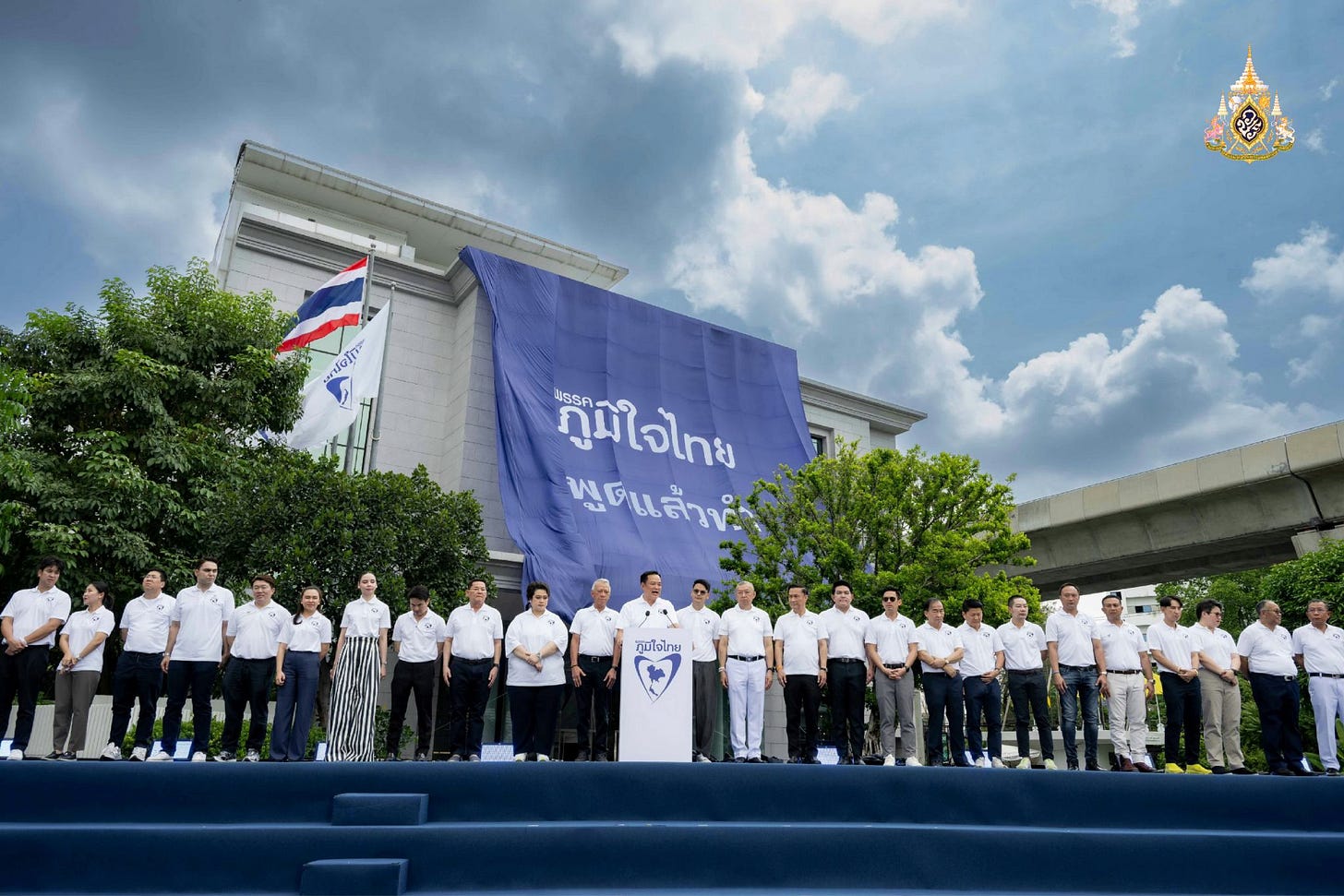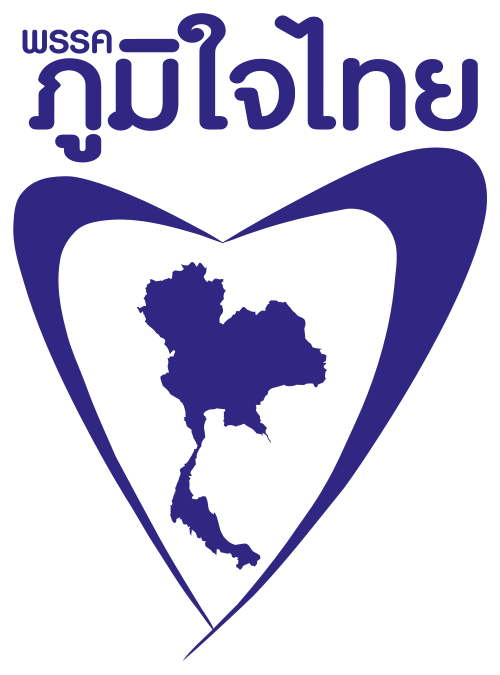No More Red in the Blue
Conflict between Pheu Thai and Bhumjaithai heats up
Earlier this month, the Bhumjaithai Party launched a new logo that was all blue. I’ve included the original logo on top and the new logo below. Party leader Anutin Charnvirakul said:
No matter how much time has changed, Bhumjaithai has never changed what we believe in and hold as our highest ideology…that is loyalty towards the [royal] institution…the Bhumjaithai Party has held on to this path for so long that we have been referred to as the “dark blue party.” This is something we consider as an honor to the Bhumjaithai Party…
…Dark blue is the color on the Thai flag and the symbol of the monarchy…we are clear about our party’s standpoint, but we will not take our stance as the dark blue party and use it to divide the people or use it to create conflict or a “colored shirt war.”
It was an act that was ripe with symbolism. For one, it has become increasingly clear that the Bhumjaithai Party is now the best placed to supplant the other conservative parties as the main party of choice for anti-Thaksin voters. The change of the party logo not only reinforces Bhumjaithai’s self-identified position as a defender of the royal institution, it also eliminates red — the color most closely tied to Thaksin and the Pheu Thai Party — from the party brand. Intentionally or not, Bhumjaithai is now demonstrating itself to be as more than just a classic Thai medium-sized party that can join hands with any coalition but instead a power center on its own, the third camp that underpins the triangular dynamics that characterizes Thai politics today.
Since the logo change, Bhumjaithai has continued to throw its weight around in significant ways. On April 9, Chaichanok Chidchob, the party secretary-general and the son of Bhumjaithai powerbroker Newin Chidchob, loudly announced his opposition to legalizing casinos — a key Pheu Thai party priority. (I recently summarized the debate over casino legalization in this piece). Although the party leadership tried to argue that it was merely Chaichanok’s personal stance, no one can mistake the clear signals being sent: Bhumjaithai is more than ready to act as the brakes on this unpopular government policy. The dark blue Senators continue to study the Entertaiment Complexes bill, and may prove willing to play a pivotal role in scuttling it. And this comes on top of all the ways Bhumjaithai has been flexing its power in recent months.
Thaksin has tried to downplay the rift in the coalition by saying that there are “no real conflicts” in the coalition. But as Malaysian Prime Minister Anwar Ibrahim’s social media team might say, Thaksin could be swearing on the Buddha and few would believe him. As the conflict between Pheu Thai and Bhumjaithai seems to grow in scale, rumors continue about the possibility of a cabinet reshuffle. Some have even speculated that ejecting Bhumjaithai from the government could be a possibility. A NationWeekend article claimed that “reports now say the Baan Chan Song Lah head [a metonym for Thaksin] is waiting for a clear signal before deciding whether to part ways or move forward with the Newin camp.” Thaksin did seem to publicly make a subtle threat to Bhumjaithai, saying that “the coalition has a sufficient number of parties,” implying that the government could survive without the 70 votes provided by Bhumjaithai. It would, however, be a very fragile coalition, and it could too severely disrupt the grand compromise that has allowed Pheu Thai to remain in power.
Rumors are even surfacing of a potential dissolution of parliament to resolve this deadlock in policy. But at this point, I still do not think that a dissolution of parliament is particularly likely. As former prime minister Abhisit Vejjajiva has argued, it is logical for governments to dissolve parliaments when they feel that are in an advantageous situation — at this point when the government feels besieged and cannot see a clear electoral advantage, why call for elections?
It does seem increasingly likely, however, that the cold war between Pheu Thai and Bhumjaithai will have to turn hot at some point. As Prajak Mawongsa, an editor for Thai PBS, wrote: Bhumjaithai is now “discussing an end to their role as the side character, because if they continue engaging in old-style politics, then there is no point in dreaming about the prime minister’s chair.” When a marriage of convenience is no longer convenient, the marriage can only fall apart.





PT and Bhumjaithai surely need each other to form a government, the latter will never join with the People's Party, neither can PT if Thaksin remains dominant.
So with its army of senators, Bhumjaithai feel they have an advantage to form a government and set policy. The question is can Thaksin drum up enough public support, as in the past, to win enough seats and the next election with a raft of populist policies?
If Yingluk can come back, perhaps so, but surely Bhumjaithai will oppose her return.
You forgot to mention that BJT announced the logo change on Chakri Day, so even more symbolism